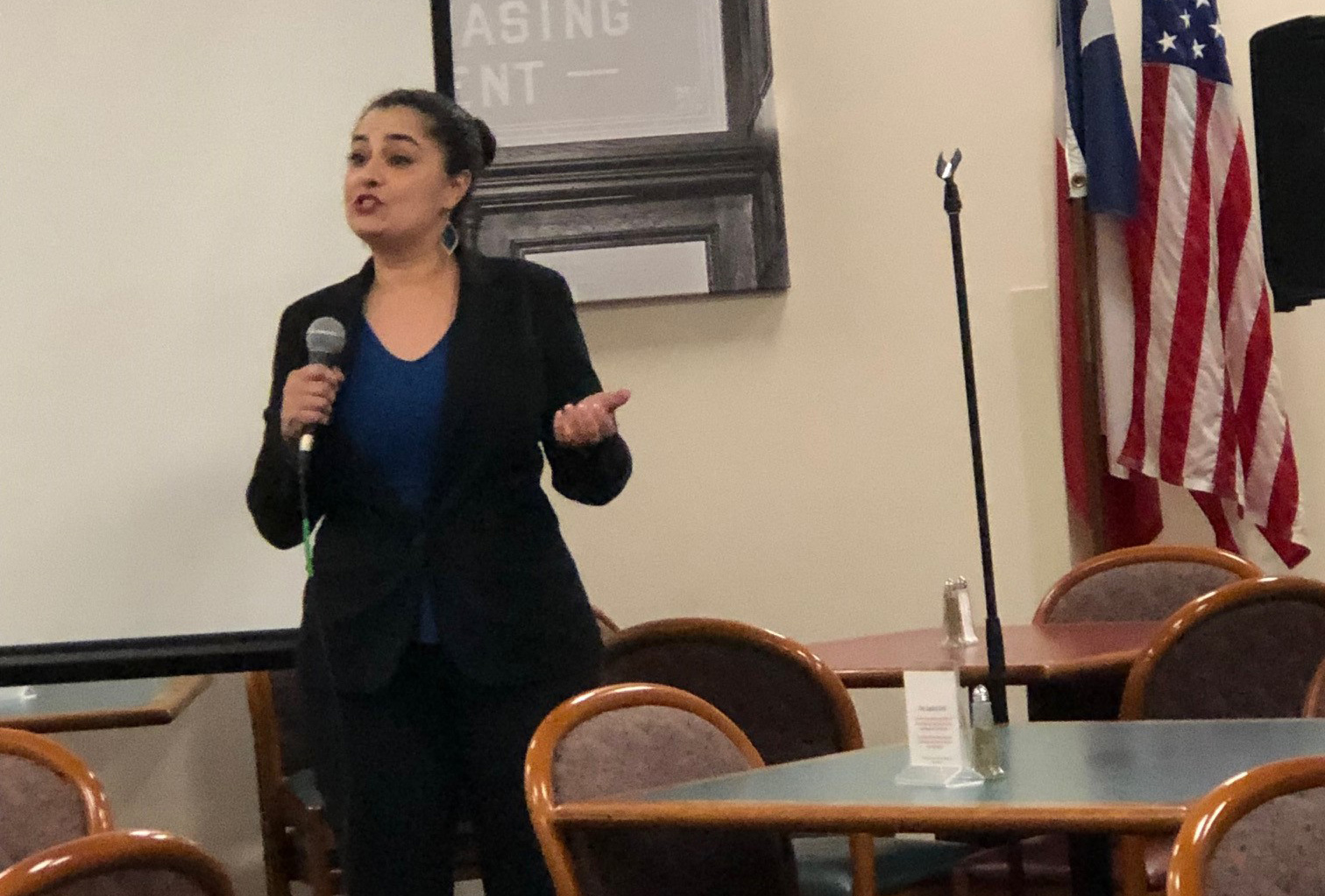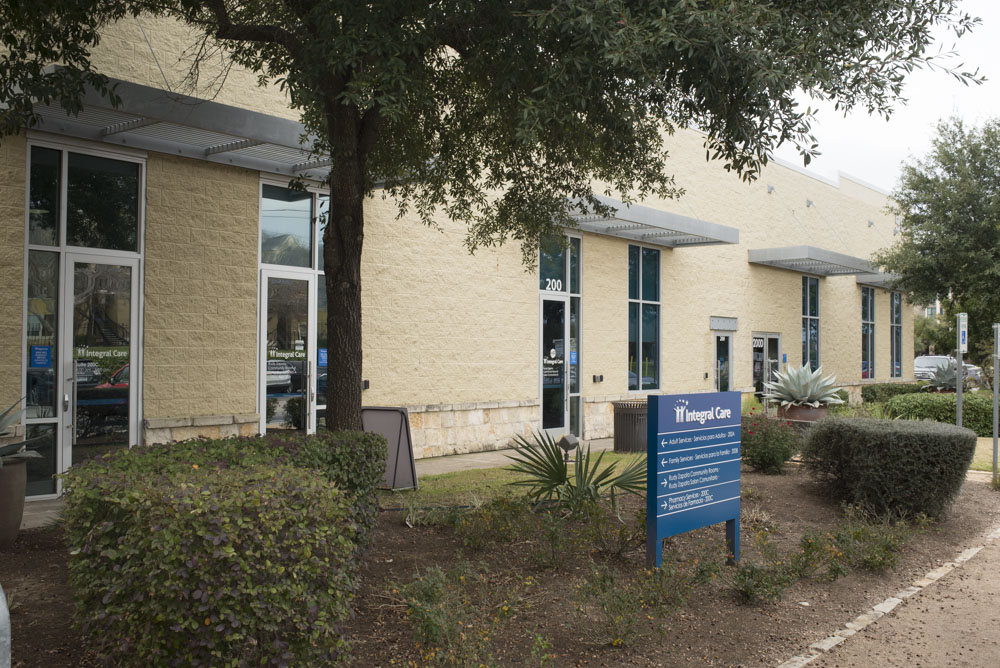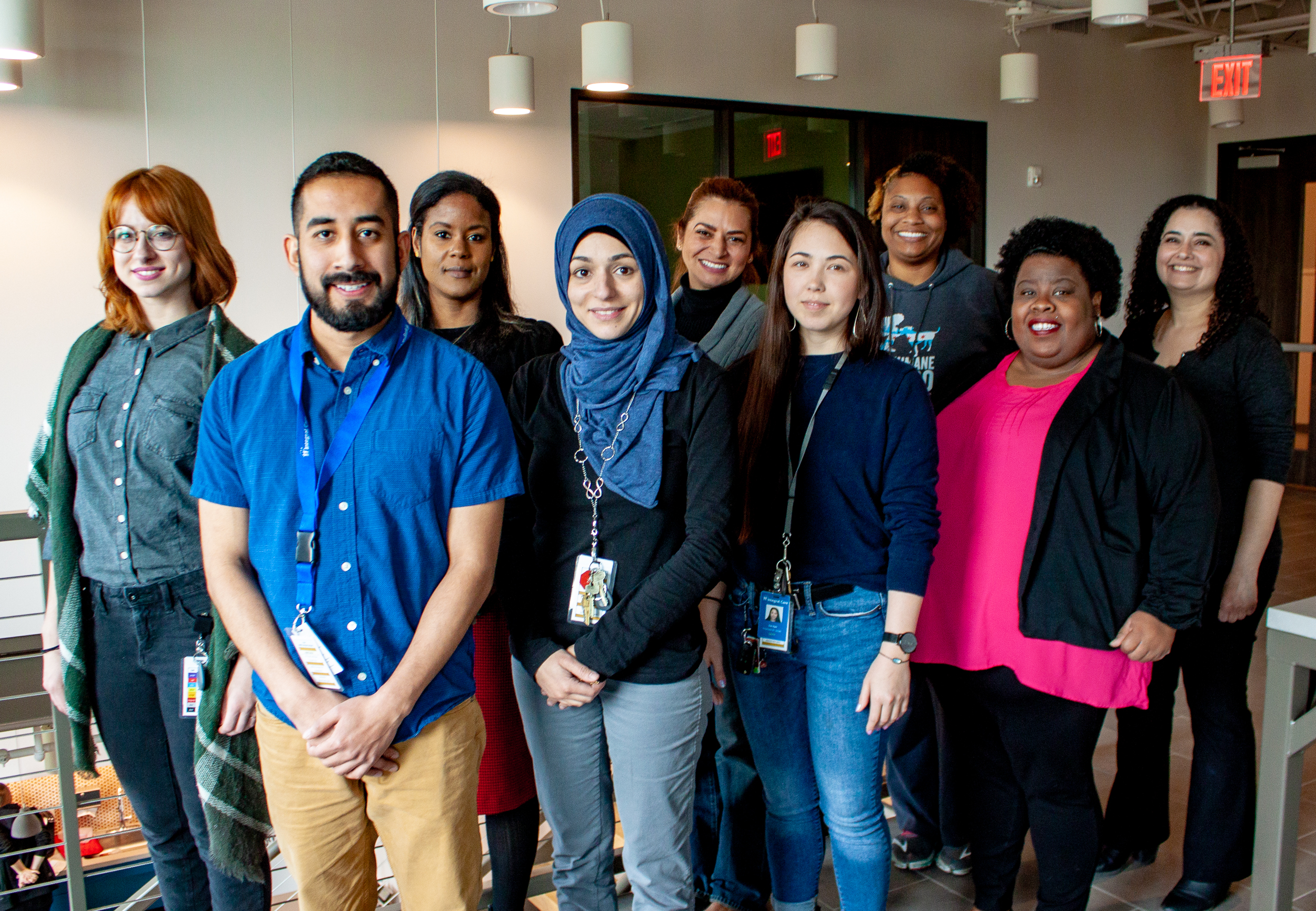TRANSPARENCIES
a monthly newsletter from Integral Care
a monthly newsletter from Integral Care

A Message From Our CEO
The 86th Texas Legislative session is in full swing, with less than two months remaining. With over 7,500 bills filed, legislators are working hard to address a wide range of issue areas – from substance use disorder to mental health in schools. We’re following the progress at the Capitol and here’s the news worth noting.

Julie Gurguis, our RA1SE Program Manager, recently spoke at a legislative briefing about first episode psychosis and the importance of early intervention and treatment.
Last week, the Texas State House passed House Bill 1, a $251 billion budget plan for 2020-2021, with $87.6 billion dedicated to health and human services. HB 1 allocates:

Laura Wilson-Slocum, LPC, Crisis Services and Justice Initiatives Practice Administrator with law enforcement partners.
A current area of concern this session is the possible 2.5% cap on property tax revenue growth, as proposed by Senate Bill 2 and House Bill 2. The current limit for local governments is 8% property tax revenue growth before residents can petition for an election. Revenue caps limit what cities can spend on police, firefighters, roads, economic development and other quality-of-life needs. Travis County is anticipated to grow at 2.4% overall for 2019, and must maintain cost increases for mandated programs, Emergency Medical Services, public health, maintenance of jail standards and more. (Hospital districts and independent school districts are exempt.) A lower cap does not address uncontrollable cost drivers that affect counties, like unfunded mandates, emergencies and a growth in the demand for services.

Integral Care therapist Michele Pierson works with a student at Beaty Elementary.
In his biennial State of the State address, Governor Greg Abbott made school safety an emergency item. Following the shooting at Santa Fe High School, the governor held roundtables with parents, students, educators, law enforcement and mental health experts. Many bills have been filed addressing mental health in schools including:

Our Dove Springs integrated care clinic was made possible by 1115 funding.
Sustaining 1115 Medicaid Waiver funding, which ends September 2021, is a significant issue this session. Through the Waiver, Integral Care has built capacity to provide care for individuals with co-occurring disorders and increased access to services, quality of care, health outcomes and efficiency. House Bill 1 amendment 73, establishes a transition plan that leverages federal funding to sustain services to the target population of adults with serious mental illness. Senate Bill 2480 creates an oversight committee to oversee and advise the Health and Human Services Commission (HHSC) regarding negotiations with the Center for Medicare and Medicaid Services (CMS) to renew the waiver. This would include an extension or renewal of the uncompensated care pool and a transition plan to follow.
The state’s opioid crisis is a priority this session, with various legislation addressing:
In 2017, nearly 3,000 people in Texas died of drug overdoses, up 4% from 2016, according to data from the U.S. Centers for Disease Control and Prevention. Legislation would help promote the adoption of best practices and reduce deaths caused by overdose.
Another area of interest in substance use is the move toward integration of treatment for mental illness and substance use disorder in the same settings, eliminating barriers to care. Senate Bill 2268 increases access to substance use services by allowing licensed outpatient substance use treatment providers to operate secondary or “satellite services” in communities where it may not be economically feasible to open, maintain and operate separately licensed facilities.
Senate Bill 10, which has already passed the Senate, would create the Texas Mental Health Care Consortium, fostering collaboration among health-related institutions with the goal of improving early identification and access to mental health services, addressing psychiatry workforce issues, coordinating mental health research and strengthening judicial training on juvenile mental health.

The Austin State Hospital (ASH) redesign is an important issue for Travis County. The last legislative session invested $300 million for improvements to the state’s psychiatric hospitals. HHSC contracted with Dell Medical School at The University of Texas at Austin to lead a collaborative – a $15.5 million preplanning and planning process to redesign the Austin State Hospital. The amount needed to fund ASH, San Antonio and Rusk State Hospitals, as well as replacements and pre-planning at several other sites is $784 million over the next two years. Advocates note that current limits in funding legislation do not cover the construction costs for the Austin State Hospital. We are providing information and education on the importance of this project to our legislators. Investment in a new public psychiatric hospital this session would be a great step in the evolution of care for Texans.
We appreciate the hard work and effort of our legislators regarding this array of behavioral health initiatives. We look forward to continuing to work with them to strengthen access to services that support healthy living for everyone in our state.

David Evans
Chief Executive Officer
Recovery After an Initial Schizophrenia Episode (RA1SE)
Transitioning from being a teenager to an adult can be tough. Add a mental health issue into the mix, and life just got tougher. Our RA1SE team makes a difference.
RA1SE is a national, recovery-based program that helps teens to young adults, ages 15 to 30, who have experienced their first episode of psychosis within the past 2 years. Psychosis can include hearing or seeing things others don’t or feeling that someone can control your thoughts. It is a sign of a serious mental illness.
The majority of individuals with serious mental illness, such as schizophrenia, bipolar disorder, and major depression, experience the first signs of illness during adolescence or early adulthood, and there are often long delays between the onset of symptoms and the point at which individuals access evidence-based interventions. In fact, 47% of young adults age 18-25 with serious mental illness didn’t receive treatment in the past year. Scientific evidence shows that the human brain is still developing until age 25. So, when young people receive coordinated specialty care in the first 1 -2 years of the onset of symptoms, the progression of illness can be prevented – limiting deterioration and preserving brain and social functioning. With early intervention and appropriate treatment, recovery is absolutely possible.
Many people who receive early treatment never have another psychotic episode. For other people, recovery means the ability to live a fulfilling and productive life, even if psychosis symptoms sometimes return. This period in a person’s lifespan is an important time to promote mental health and reduce the disruptive consequences of untreated mental illness.
“The RA1SE team motivates me, they inspire me to be better, they help me be comfortable with myself. They hold me accountable in a good way….I wouldn’t be as happy with my life or in as good of place as I am without them.” – Kevin, RA1SE Client
 Our team of mental health professionals, case managers, peer support specialists, a parent specialist, an employment and education specialist, skills trainer, nurse and physician’s assistant builds a personalized care plan around an individual’s goals. Since they provide intensive community-based services, their caseload is small. They help clients obtain employment, return to school, foster healthy relationships, build coping skills and advocate for their needs in an effective way. Eighty percent of clients obtain employment and/or enroll in school.
Our team of mental health professionals, case managers, peer support specialists, a parent specialist, an employment and education specialist, skills trainer, nurse and physician’s assistant builds a personalized care plan around an individual’s goals. Since they provide intensive community-based services, their caseload is small. They help clients obtain employment, return to school, foster healthy relationships, build coping skills and advocate for their needs in an effective way. Eighty percent of clients obtain employment and/or enroll in school.
Integral Care brought RA1SE to our community nearly 3 years ago, in June 2016. We are extraordinarily proud of the team – diverse in expertise, background, race, and culture. Several team members speak Arabic or Spanish. One speaks Japanese. RA1SE supports Travis County’s transition-age youth and helps pave their road to success, as they build a foundation for adulthood.
Texas Institute for Excellence in Mental Health
Who exactly helps Local Mental Health Authorities (LMHAs) across the state of Texas achieve person-centered, recovery-driven services that follow the most current best practices? Answer: The Texas Institute for Excellence in Mental Health.
 Part of The University of Texas at Austin Steve Hicks School of Social Work, the Institute is a team of researchers and skilled mental health professionals. They conduct targeted research to determine best practices. They perform rigorous evaluations of behavioral health programs across the state. They support the implementation of new programs with training or connection to the right trainers and facilitation of strategic planning. They also have an eye on policy, promoting strong mental health systems at the state and local level. In a nutshell, the Institute guides many system change initiatives and serves as the intermediary between LMHAs and Health and Human Services (HHSC). According to Deborah Cohen, PhD, “We’re always trying to be supportive, to help agencies be the best they can be.”
Part of The University of Texas at Austin Steve Hicks School of Social Work, the Institute is a team of researchers and skilled mental health professionals. They conduct targeted research to determine best practices. They perform rigorous evaluations of behavioral health programs across the state. They support the implementation of new programs with training or connection to the right trainers and facilitation of strategic planning. They also have an eye on policy, promoting strong mental health systems at the state and local level. In a nutshell, the Institute guides many system change initiatives and serves as the intermediary between LMHAs and Health and Human Services (HHSC). According to Deborah Cohen, PhD, “We’re always trying to be supportive, to help agencies be the best they can be.”
The Institute is working alongside Integral Care as we strengthen services for transition age youth. They are helping us build a more robust continuum of care for this critical age group.
The Institute has a vision for 16-25 year olds experiencing mental health issues for the first time, as well as those making the traditionally difficult transition from children’s mental health services to adult services.
“We want to see people with mental health concerns achieve their hopes and dreams. In order to do that, we need to change how our system and policies interact with, and affect transition-age youth. Our current system and policies are largely influenced by our (public mental health) establishment in the 1960s. It is time for a new approach that truly values everyone’s potential. Integral Care is a champion for how to implement meaningful change for this age range, and rethink community mental health.” – Deborah Cohen, PhD
Our partnership with the Institute is not new. We’ve worked together on the Health Community Collaborative, YES Waiver, Home and Community-Based Services Waiver, peer support specialist and trauma informed care initiatives. Together, we strive to improve health outcomes for the people of Travis County.
March 2019: Making Opportunities for Recovery More Accessible
February 2019: Recovery is Possible
January 2019: Stronger Outcomes Through Collaboration
December 2018: Looking ahead to the 86th Texas Legislature
November 2018: How Tech is Changing the Face of Mental Health
October 2018: A Few Questions Could Help Save a Life
September 2018: Anyone Can Save a Life
August 2018: A Milestone Moment
July 2018: Equity in Mental Health Care for All
June 2018: Expanding Services for Veterans
May 2018: Your Mental Health Toolkit
April 2018: Time of Terror Calls for Increased Emotional Support
March 2018: Stopping the cycle of incarceration for individuals with mental illness
February 2018: Equity in mental healthcare for everyone
January 2018 : Improving Mental Health Through Partnership & Collaboration
December 2017: Strength Through Community
November 2017 : Healthy Lifestyles Improve Well-Being
October 2017 : National Child Health Day
September 2017 : Strengthening Families and Communities